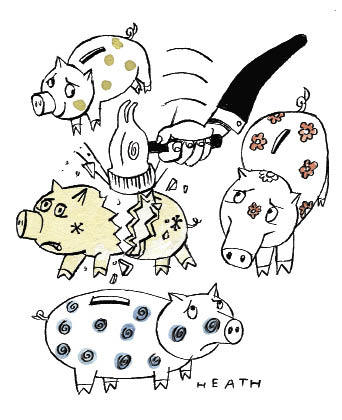No
The proposal on the American table is simple: break up the so-called super banks. To have the deposit-taking banks in one place, and the risk-takers (or proprietary traders) in another. The aim is laudable: that Main Street should not have to pay for Wall Street. This is, after all, the system which existed under Glass-Steagall, the Depression-era legislation. But that broke down, because finance became much more international, ingenious, complex and important. That global genie cannot be squeezed back into the national bottle — and if Obama tries, some genies may well bring their tax dollars here.
The banking disease was not obesity but behaviour. Financial institutions got into deep trouble principally because of old-fashioned bad banking and weak risk management, not because of proprietary trading or newfangled derivatives. Lehman Brothers, whose failure precipitated the crisis, was not even a bank. To draw distinctions between the types of banks may well be a radical solution — but it is one which does not address the problem.
Whenever American presidents embark on raids on their financial sector, Britain has had plenty to gain by taking a less vindictive, more moderate line. In 1963, JFK taxed income on foreign-owned stocks and shares, hoping to discourage Americans from investing abroad. So what did American companies do with the dollars they held abroad? Rather than repatriate them, they simply loaned them to non-American investors — and the Eurobond market was born. London was its centre and New York was the loser. Then, after the Enron scandal, America tightened regulations on companies trading on its stock exchange. They were too tight for foreign companies, who listed in London. The City benefited again.
If London and New York make the same regulatory mistakes, then both will lose out. Although controversial, the listing of Rusal, the Russian aluminium giant, in Hong Kong, along with HSBC moving its strategic headquarters there, illustrate how capital markets are moving east. The City generated £20 billion of tax revenue in 2008 — enough to pay the Home Office budget twice over. The quicker the City recovers, the less ordinary taxpayers will be asked for.
The future lies in a properly regulated City, one with greater transparency to illuminate the conflicts of interest inherent in integrated banks. It can throw its arms open and welcome hedge funds, private equity and listing refugees from around the world. The City should stand for liberty — but properly regulated liberty. And this is the fastest route to recovery.
Ken Costa is chairman of Lazard International and Gresham Professor of Commerce.
Yes
Does the banking system need fixing? Given that its explosion may yet end up costing each British householder some £20,000 — in national debt, to be repaid by taxes — there is a case for saying that the sector needs a lot of reform along the lines proposed by Barack Obama. Those who think it doesn’t should consider the following facts.
The last ten years witnessed two of the largest equity market collapses in history — the dotcom bust and the bank collapse — and probably £3 trillion in bank lending losses. Shareholders who had invested in bank stocks with investment bank arms have lost a fortune. And remember: the stock market is not owned by gentlemen in White’s. Investment in banks represented a very significant part of people’s retirement savings.
Despite the shareholders getting nothing, the financial intermediaries have seen their incomes go through the roof. Something is clearly — and massively — wrong here. The owners of capital keep losing, and the middle men keep winning. This is not the Anglo-Saxon capitalist model people felt they had signed up for. Above all else, the bank bailouts and subsequent bonus bonanza is fundamentally offensive to the US and UK culture — the simple premise that reward should be for success. The entitlement culture shown by parts of the banking sector here is reminiscent of 1970s trade unionism.
When Thatcher and Reagan promoted much wider share ownership (a fundamentally good idea) they failed to see that politicians like Larry Summers and Gordon Brown (long very close to parts of the investment banking industry) would rig the market against the owners of capital. If the financial sector is once again to provide huge value to the economy, and to its shareholders, then it needs to return to its pre-1997 market and shareholder-orientated structure.
Breaking up the banks — some form of Glass-Steagall-style separation of super-risk-taking and deposit-taking — is likely to be unavoidable given that the creditworthiness of nations will increasingly depend on how they protect themselves from banks deemed ‘too big to fail’. Rather than a threat to London, the City will benefit from reversing the consolidation trend of the past 20 years. Encouraging smaller and specialised firms may enhance the competitiveness of London.
It is to the credit of George Osborne that he was one of the first senior politicians to realise the importance of banking reform. Conservatives should own the issues of financial sector reform and shareholder rights. Thatcher created the first City Big Bang by recognising the need to reform the vested interests and increase competition. The Cameron government should show the same determination and create Big Bang II.
Mark Bathgate is an investment analyst and managing director of Tweeddale Advisors.






Comments